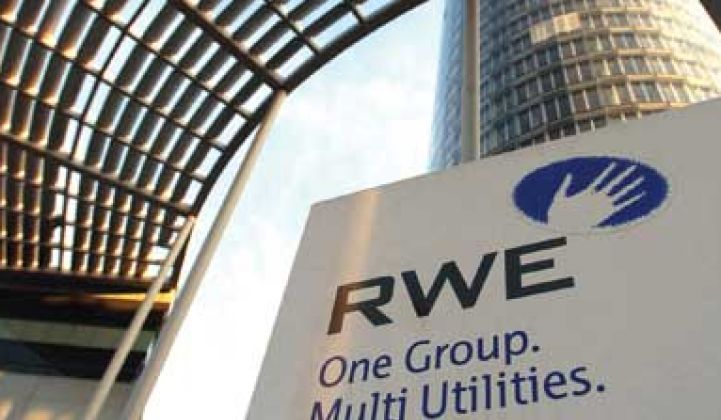We may be about to witness one of the most profound transitions ever to occur in the utility industry.
Challenged by the surge in distributed renewables and a strong decline in revenues, one of Europe's largest largest utilities, RWE, is reportedly planning to completely transform itself from a traditional electricity provider into a renewable energy service provider.
The utility's new philosophy: either adapt -- or wither away and die.
“The massive erosion of wholesale prices caused by the growth of German photovoltaics constitutes a serious problem for RWE which may even threaten the company’s survival,” wrote the utility in a recent strategy paper.
The strategy documents were initially outlined by the European energy website Energy Post. The site reported that the strategy was agreed upon by RWE's board last month and will be evaluated within the entire company at the end of October.
Greentech Media has not been able to get the full report, but RWE confirmed that the strategy has been discussed within the company and with investors.
According to the documents, RWE wants to move away from simply being a developer and owner of centralized power plants and instead help use its expertise to help manage and integrate renewables into the grid.
“The guiding principle is ‘from volume to value’ with technologies ranging from large-scale offshore wind and hydro to onshore wind or photovoltaic. But we will no longer pursue volume or percentage targets in renewables. We will rather leverage our skill set by taking a ‘capital-light’ approach. Based on funds sourced largely from third parties, we will position ourselves as a project enabler and operator, and [as a] system integrator of renewables," read the documents published by Energy Post.
Instead of simply transmitting electricity and selling kilowatt-hours, RWE wants to think of itself as a conduit for renewable energy projects -- helping manage risk without making dramatic new capital investments.
Citing a "prosumer" business strategy, the documents read as if they were written by a consumer electronics company, not a legacy utility.
“Developing an innovative and profitable prosumer business model is a challenge we also need to address successfully, as we see a billion-euro market emerging alongside our traditional value chain."
This is not a small, progressive-minded municipal utility calling for a shift to renewables. RWE provides electricity and gas for 24 million customers throughout Europe and is one of the biggest emitters of carbon in the region. The company operates a portfolio worth 50,000 megawatts of capacity that includes large coal, natural gas and oil-fired power stations.
RWE has been forced into a tough spot by the surge in distributed generation, particularly in Germany, where more than half of renewables are owned by customers. Major utilities like RWE directly own only a small portion of renewables in the country.
This surge in renewables has lowered wholesale prices and has even periodically caused prices to go negative during peak hours, forcing utilities to ramp down production from fossil-fuel plants and lose revenue. The situation has been exacerbated by the over-build of centralized fossil fuel plants in the last decade. Utilities expected Europe's electricity demand to grow. Instead, it has declined in the post-recession era.
As The Economist reported earlier this month, RWE's share price has lost one-third of its value over the last three years due to the new market reality. Rather than let these difficulties shrink RWE's revenue further, executives appear willing to embrace an entirely new model to manage the shift.
“We have to manage innovation more creatively and professionally in the future. We need to establish a culture, structures, and processes that allow us to develop new business models which go beyond incremental improvement of the existing value chain. In a highly uncertain and volatile business environment, we need to transform ourselves from a ‘risk mitigation’ to an ‘uncertainty management’ company,” wrote the utility.
These changes are arguably more transformative for the utility business model than deregulation, which shook up some vertically integrated utilities in Europe and the U.S. throughout the 1990s and 2000s.
European countries are more advanced in the integration of renewables, so it's natural that this kind of planned shakeup at a large utility is happening there first. But the conversation around the future of utilities is also becoming more sophisticated in the U.S.
In a landmark report this summer, the Edison Electric Institute, a group representing America's investor-owned utilities, warned that distributed generation is a looming danger to revenue and customer engagement.
"The threat of disruptive forces (i.e., new products/markets that replace existing products/markets) impacting the utility industry is increasing and is adding to the effects of other types of disruptive forces like declining sales and end-use efficiency," wrote author Peter Kind. "Recent business history has provided many examples of companies and whole industries that either failed or were slow to respond to disruptive forces and suffered as a result."
Assuming the planned strategy eventually translates into real change at RWE, the utility may provide a model for American power providers facing similar challenges on the horizon.



